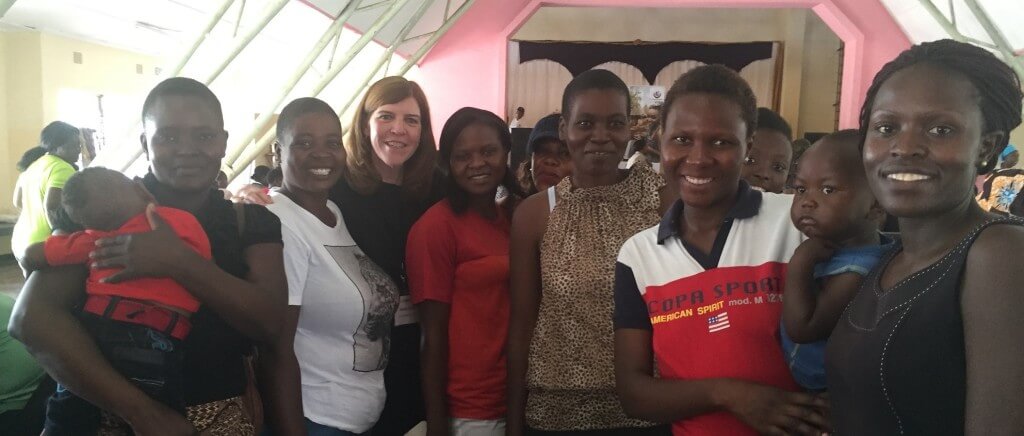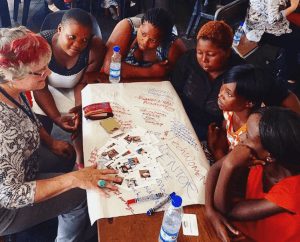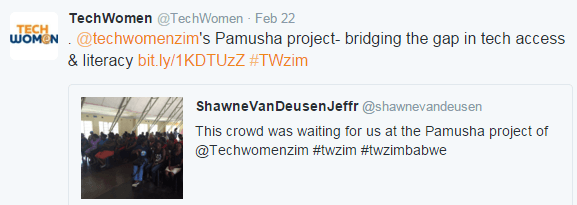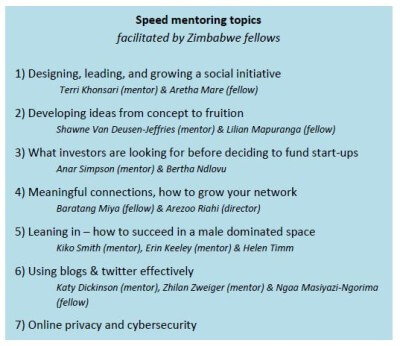By Samera Edwards
“The heart and soul of the program extends well beyond the five weeks of TechWomen. Connections are built with a powerful network of women around the world who have similar challenges and successes.”
– Arezoo Riahi, Director
The second day of the Zimbabwe delegation trip reflected what TechWomen is about: working globally to foster deep connections, supporting women to support others and promoting STEM careers for young women.

Women from the Pamusha project with Sheila Casey of the Bureau of Educational and Cultural Affairs
Embassy briefing
“Take my word for it – amazing things are happening in Zimbabwe,” a representative of the U.S. embassy said, about the huge strides and increasing potential for women, technology and entrepreneurship in Zimbabwe. During the briefing hosted by the embassy, the delegation learned about U.S.-Zimbabwe relations, Zimbabwean culture, and the embassy’s efforts to support and unite alumni from the various U.S. government programs in Zimbabwe. The group was thrilled to hear that the government of Zimbabwe offers scholarships for students who want to study science. The government also sponsored a Zimbabwean version of the U.S. show, Shark Tank, which they believe will be influential in encouraging Zimbabwean citizens to invest in their own country’s entrepreneurs and startups. The open discussion during the briefing allowed the delegation to see the promising future for Zimbabwe’s innovative and entrepreneurial spirit.
Pamusha Project visit

TechWomen mentor Katy Dickinson leading a breakout session with girls in the Pamusha Program
Pamusha Technology Village, one of the projects supported by Techwomen Zimbabwe (TWZ), is “a space for girls and young women from underserved communities to bridge the gap in technology access, literacy and usage at the grassroots level.” TechWomen mentors led breakout sessions with women of the Pamusha project, and they discussed barriers to access internet and technology, as well as potential solutions. The mentors used their experience and expertise to showcase the value of being involved in STEM and allowed the Pamusha project members to see the potential in these fields. Two girls in their final year of secondary school explained the impact of the Pamusha program on their lives, “Jobs nowadays require knowledge of computers. I didn’t have that before, but now I do, and I feel like I am eligible for new opportunities.”

University of Zimbabwe speed mentoring and career talks
Among a large group of young women from 14-years-old to college seniors, IIE San Francisco director, Mary Karam McKey opened the session with energizing remarks encouraging the girls that the TechWomen global network is here to support women in their field. “Know that STEM fields are for you! The world needs your thinking, your ideas and your solving of the world’s problems. If you’re ever feeling like STEM fields aren’t for you, remember you’re surrounded by a global community of women and make allies that believe in you. You have the ability to contribute in these fields.”  Before starting the speed mentoring and career talks, TechWomen mentor Katy Dickinson and
Before starting the speed mentoring and career talks, TechWomen mentor Katy Dickinson and
Baratang Miya, a 2015 fellow from South Africa, drove home the importance of professional mentorship. Baratang emphasized that mentorship is an opportunity to learn from a “chain of knowledge,” because a mentor can also open doors to other connections. Fionah Mazvita, a civil engineering student, expressed the immediate impact of the session. “Everyone here can testify we learned so much more today than we could by googling! Thank you for the vast opportunities that you have made us aware of.”
Official launch of HerCode fellows program at the Zimbabwe Institute of Engineers
TechWomen mentors, Zhilan Zweiger and Erin Keeley joined two Zimbabwean women on a panel to share inspirational stories of their careers in STEM and overcoming challenges along their journey. Both Zhilan and Erin explained that they are passionate about their jobs because they are able to find new solutions and solve problems.
A main focus of the event was also to recognize the challenges and opportunities local women experience in their fields. “From an African woman perspective, women run homes…we run everything.” A local engineer added, when women enter the workforce, they are able to make key contributions that are often different than men. “It is still very difficult for African women to win, in terms of being accepted, but people are seeing that we are serious, and we are doing the right thing.” Erin also emphasized inclusion and acceptance by talking about her perspective as a woman in a Silicon Valley tech company and gave valuable advice to the audience: “I don’t see myself as a female engineer, just as an engineer. Also, I have always tried to be collaborative rather than competitive. My new motto is ‘bring a woman along.’”
The panel marked the launch of the HerCode fellows program. HerCode, an initiative of Techwomen Zimbabwe (TWZ), combines workshops, discussions, face-to-face learning, e-learning opportunities and local community outreach. The goal is to reach more than 700 women in disadvantaged communities and to apply digital skills training to reach a larger market. Their key activities will start with health and agriculture solutions, development of technical skills and training women to train others.

Stay tuned for more updates from TechWomen’s Zimbabwe delegation trip.


Speak Your Mind